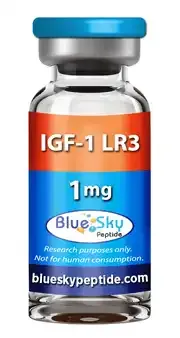
Shop IGF1-LR3 1mg online
Availability: In stock
$0.00
- Buy 10 for $73 each and save 42%
- Free Priority Shipping
- With Purchase over $99 | USA ONLY
Buy Bulk Premium Recombinant Research Grade IGF-1 LR3 1mg ( No Promo Codes):
| Unit Size | 1 mg/vial |
| Unit Quantity | 1 vial |
| Purity (Mass Spectrometry & UV) | 99.81% |
| Sequence | MFPAMPLSSL FVNGPRTLCG AELVDALQFV CGDRGFYFNK PTGYGSSSRR APQTGIVDEC CFRSCDLRRL EMYCAPLKPA KSA |
| Molecular Formula | C400H625N111O115S9 |
| Appearance | Lyophilized White Powder |
| Source | Recombinant Synthesis |
| Storage | Lyophilized IGF-1 LR3 is Stable at room Temperature for 90 days, however it is best to store in a freezer below - 8c for any extended period of time. |
| Terms | The products we offer are intended for laboratory research use only. Please familiarize yourself with our terms of service prior to ordering. |
Product Overview: IGF1-LR3 1mg is a synthetic peptide variant of insulin-like growth factor 1 (IGF-1), an essential protein naturally produced in the body. IGF1-LR3 has been widely researched in animal models and in vitro studies, exploring its effects on muscle growth, nutrient uptake, and cellular repair. This peptide is strictly for in vitro laboratory research and is not intended for human or veterinary use.
Research Insights and Applications:
- Organ-Specific Fetal Growth in Animal Studies: Research in animal models, such as pregnant sheep, has shown that IGF1-LR3 can influence fetal organ growth and myoblast proliferation in skeletal muscle, without significantly impacting overall fetal weight or nutrient transfer. These findings suggest that IGF1-LR3 may promote organ-specific growth by optimizing nutrient utilization in fetal development research.
- Intestinal Cell Growth and Repair: In in vivo studies on mice, IGF1-LR3 demonstrated a similar effect on small intestinal growth as natural IGF-1, but with a more substantial influence on mucosal cellularity. This points to IGF1-LR3’s potential as a more potent option for studying intestinal growth and repair, with potential applications in gastrointestinal research.
- Muscle Wasting and Cancer Cachexia: In a mouse model of cancer-associated cachexia, IGF1-LR3 showed potential in preventing muscle wasting. In vitro experiments indicated an increase in the differentiation index of muscle cells, while in vivo studies revealed a limited effect on muscle preservation. However, IGF1-LR3 was associated with accelerated tumor growth, suggesting a need for cautious evaluation of its role in muscle maintenance versus tumor risk.
Note: IGF1-LR3 1mg is intended solely for in vitro laboratory research in controlled environments. It is not approved for human or animal use.
References:1. Stremming J, et al. Front Physiol. 2022;13:954948.
2. MacDonald RS. Horm Metab Res. 1999;31(2-3):103-13.
3. Levolger S, et al. Sci Rep. 2019;9(1):9826.


